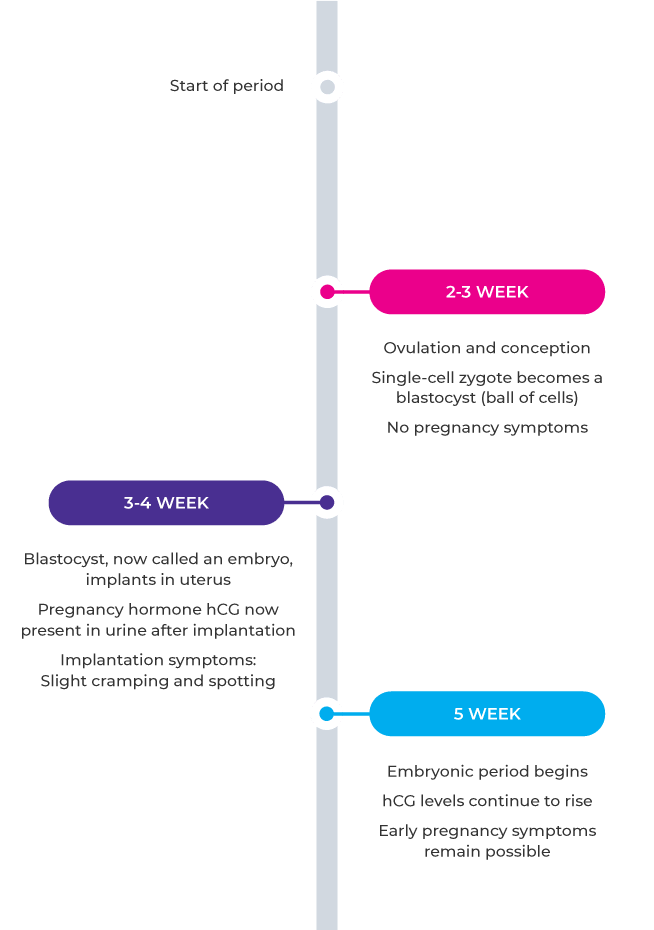
Pregnancy Symptom Timeline: A Comprehensive Guide
Pregnancy is a transformative journey that brings about a myriad of physical, emotional, and hormonal changes. Understanding the timeline of these symptoms can help expectant mothers navigate this remarkable experience with confidence and ease.
First Trimester (Weeks 1-12)
- Missed period: This is often the first indication of pregnancy.
- Breast tenderness and enlargement: Increased blood flow and hormonal changes can cause breasts to become swollen and sensitive.
- Nausea and vomiting (morning sickness): These symptoms typically begin around week 6 and peak around week 8-12.
- Fatigue: Progesterone levels rise during pregnancy, leading to increased sleepiness.
- Frequent urination: The growing uterus puts pressure on the bladder, causing more frequent bathroom trips.
- Mood swings: Hormonal fluctuations can trigger emotional highs and lows.
- Constipation: Progesterone slows down digestion, leading to constipation.
- Food cravings and aversions: Altered taste buds and hormonal changes can lead to intense cravings or aversions to certain foods.
- Skin changes: Increased blood flow can cause the skin to become flushed or develop dark patches (chloasma).
- Headaches: Hormonal changes and increased blood volume can contribute to headaches.
Second Trimester (Weeks 13-27)
- Increased energy: Nausea and fatigue often subside, leaving expectant mothers feeling more energetic.
- Growing belly: The uterus expands rapidly, making the belly more noticeable.
- Fetal movement: Around week 18-22, mothers may begin to feel the baby’s movements.
- Round ligament pain: Stretching of the ligaments supporting the uterus can cause sharp pains on the sides of the abdomen.
- Varicose veins: Increased blood volume and pressure can lead to varicose veins in the legs.
- Hemorrhoids: Constipation and pressure from the growing uterus can cause hemorrhoids.
- Nasal congestion: Hormonal changes can cause nasal congestion and bleeding.
- Carpal tunnel syndrome: Fluid retention and nerve compression can lead to tingling and numbness in the hands.
Third Trimester (Weeks 28-40)
- Braxton Hicks contractions: These irregular contractions prepare the uterus for labor.
- Pelvic pressure: The baby’s head descends into the pelvis, putting pressure on the bladder and rectum.
- Frequent urination: Pelvic pressure increases the need to urinate more frequently.
- Swelling (edema): Fluid retention can cause swelling in the hands, feet, and ankles.
- Back pain: The growing uterus and hormonal changes can strain the back.
- Sleep disturbances: Pelvic pressure, frequent urination, and hormonal changes can disrupt sleep.
- Colostrum leakage: The breasts may start producing colostrum, a precursor to breast milk.
- Nesting instinct: A surge of energy and desire to prepare for the baby’s arrival.
Labor and Delivery
- Labor contractions: Regular, strong contractions that push the baby down the birth canal.
- Water breaking: The amniotic sac ruptures, releasing fluid.
- Crowning: The baby’s head becomes visible at the vaginal opening.
- Delivery: The baby is born.
- Placental delivery: The placenta, which has been nourishing the baby, is delivered after the baby.
Postpartum Period
- Afterpains: Contractions that help the uterus return to its original size.
- Vaginal bleeding (lochia): Bleeding that occurs after delivery as the uterus heals.
- Breast engorgement: Milk production increases, causing the breasts to become full and tender.
- Mood swings: Hormonal changes can lead to emotional highs and lows.
- Fatigue: Recovery from labor and the demands of caring for a newborn can be exhausting.
- Constipation: Hormonal changes and pain medications can slow down digestion.
- Hemorrhoids: The pressure of labor and delivery can worsen hemorrhoids.
Variations in Symptom Timeline
It’s important to note that the timing and intensity of pregnancy symptoms can vary significantly from woman to woman. Some may experience more severe symptoms than others, while some may not experience certain symptoms at all.
When to Seek Medical Attention
If you experience any of the following symptoms during pregnancy, seek medical attention immediately:
- Severe abdominal pain
- Vaginal bleeding
- High fever
- Persistent vomiting
- Blurred vision
- Severe headaches
- Calf pain or swelling
- Sudden swelling in the hands, feet, or face
Understanding the pregnancy symptom timeline can empower expectant mothers to navigate this transformative journey with confidence. By recognizing the common symptoms and knowing when to seek medical attention, they can ensure a healthy and fulfilling pregnancy experience.